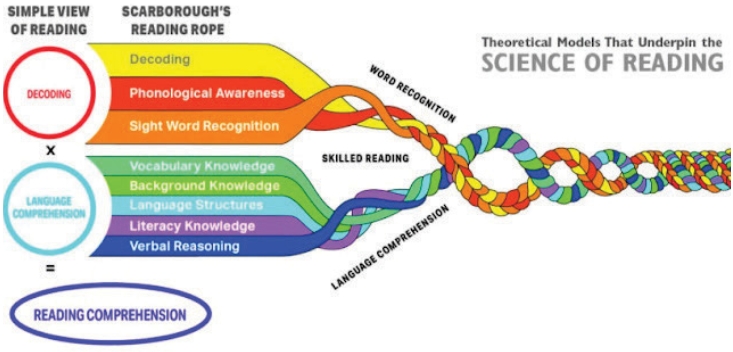How Science of Reading Has Changed the Landscape of Reading in Schools

What is the Science of Reading?
The Science of Reading (SOR) is a huge amount of interdisciplinary, scientifically based research about reading and learning issues related to reading and writing, such as dyslexia, but not only that. This research has been conducted over the last 60 or so years around the world, and it includes thousands of studies conducted in multiple languages and countries.
The ongoing converging evidence of what matters and what works in reading and literacy instruction is now organized around models that describe the “how and why” from this research. The conclusion is that reading begins in the brain, and not in the classroom. This body of research is not new, but it is the compilation of years of research. Now, with the technological advances of fMRI, there are studies that can observe exactly what is happening in the brain through imaging while the person is reading. The new insights have helped scientists affirm what was already known: Reading is not a natural process like speaking and walking, but rather a complicated series of interactional processes in the brain that must all work in the right way and with the right instruction and timing, so that reading becomes a skill learned and used naturally by the brain. This is why so many different learners struggle with reading both those with and without dyslexia.
What the Science of Reading (SOR) is NOT is an ideology, a philosophy, a political agenda, a one-size-fits-all approach, a program of instruction, nor a specific component of instruction.
Louisiana Literacy Legislation SB 216 required each teacher of kindergarten through third grade who teaches reading, math, science or social studies, and any administrator of a school with K through third grade, to complete an approved professional development course in foundational literacy skills by the beginning of the 2023-2024 academic year or the first year of employment in that capacity. These foundational literacy courses are based in SOR and are comprised of the understanding that reading is a complicated process of learning in the brain. For more information, visit https://www.louisianabelieves.com/academics/louisiana-literacy.
The Simple View of Reading is that a combination of decoding and language acquisition is what is needed to read. In reality, it is much more complicated; however, for explanation, this is a simplified view.
Dr. Hollis Scarborough, creator of the famous Reading Rope and senior scientist at Haskins Laboratories, is a leading researcher of early language development and its connection to later literacy. The genesis of Scarborough’s Reading Rope dates back to Scarborough’s talks about the complexities involved in learning to read. Originally, she spoke of skilled reading as resembling the “strands” of a rope. She used pipe cleaners to illustrate the interconnectedness and interdependence of all the components to help parents to understand.
The Reading Rope consists of lower and upper strands. The word-recognition strands (phonological awareness, decoding, and sight recognition of familiar words) work together as the reader becomes accurate, fluent and increasingly automatic with repetition and practice. At the same time, the language comprehension strands (background knowledge, vocabulary, language structures, verbal reasoning and literacy knowledge) must be developed, and they reinforce one another before they weave together with the word-recognition strands to produce a skilled reader. The Reading Rope, created by Dr. Hollis Scarborough, captures the essence of this task. This does not happen overnight; it requires instruction and practice over a period of time. For many children, learning to read is a challenging undertaking, as their thinking skills are not fully developed or they struggle with cognitive weaknesses that affect these learning processes.
Cognitive weaknesses may impact the learning process, making it extremely difficult -- if not impossible -- for some children to learn to read. This is the core reason why understanding the cognitive skills processes is urgent, and the role they play in learning is extremely important. Learning requires a series of skills that involve attention, processing speed, executive functioning and memory, to name a few. When learning to read, other skills such as logic, reasoning, auditory processing and visual processing also become major factors to the process. When a person has a weakness in any of these areas in the brain, the thinking processes become laborious and lead to long-term struggles.
Understanding how these processes work and which skills are performing at optimal level versus those that need enhancement is a key to understanding how a person learns. With the right resources and interventions, all people can learn to learn and learn to read.

The first step has been made, and it was a giant leap for all humankind: understanding that reading begins in the brain and not just in the classroom. This allows one to embrace the learning difference and approach the process more effectively and efficiently. The process is starting in Louisiana but as with all things, it will take a while. Families can make the difference by starting at home. Resources are available through local organizations such as LearningRx and their community partners doing the reading challenge #chillandread, and the Shreve Memorial Library.
Online resources exist also: https://improvingliteracy.org/family/index.html. For activities to engage your family in literacy, https://www.louisianabelieves.com/resources/library/family-supporttoolbox-library.
Resources cited or used:
https://www.louisianabelieves.com/
https://ila.onlinelibrary.wiley.com/doi/full/10.1002/trtr.2315
https://dyslexiaida.org/ https://improvingliteracy.org/state-ofdyslexia/louisiana/
Donesa Walker, M.Ed. BCCS, is the owner of LearningRx Shreveport. Contact Donesa at: dwalker@learningrx.net.
